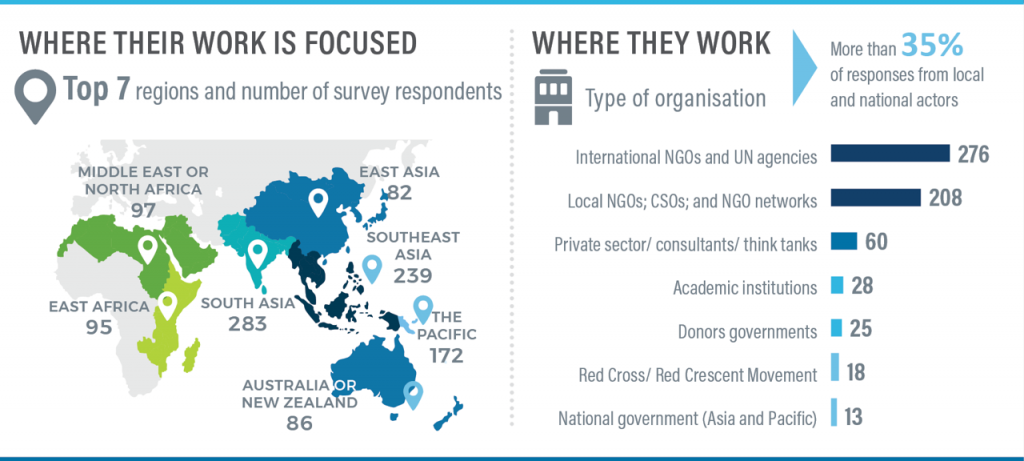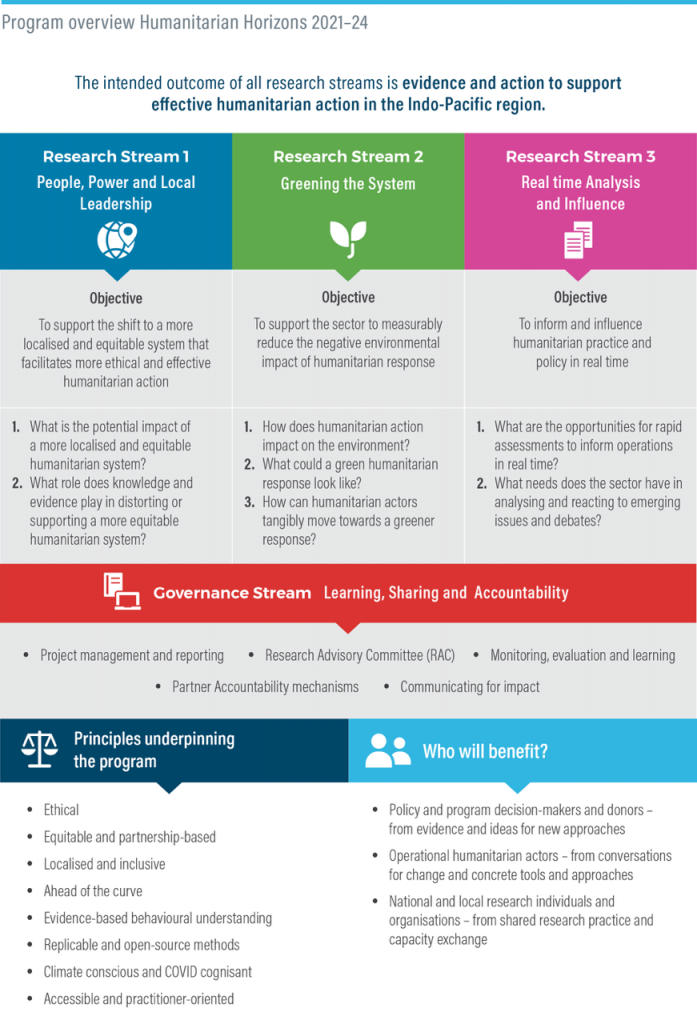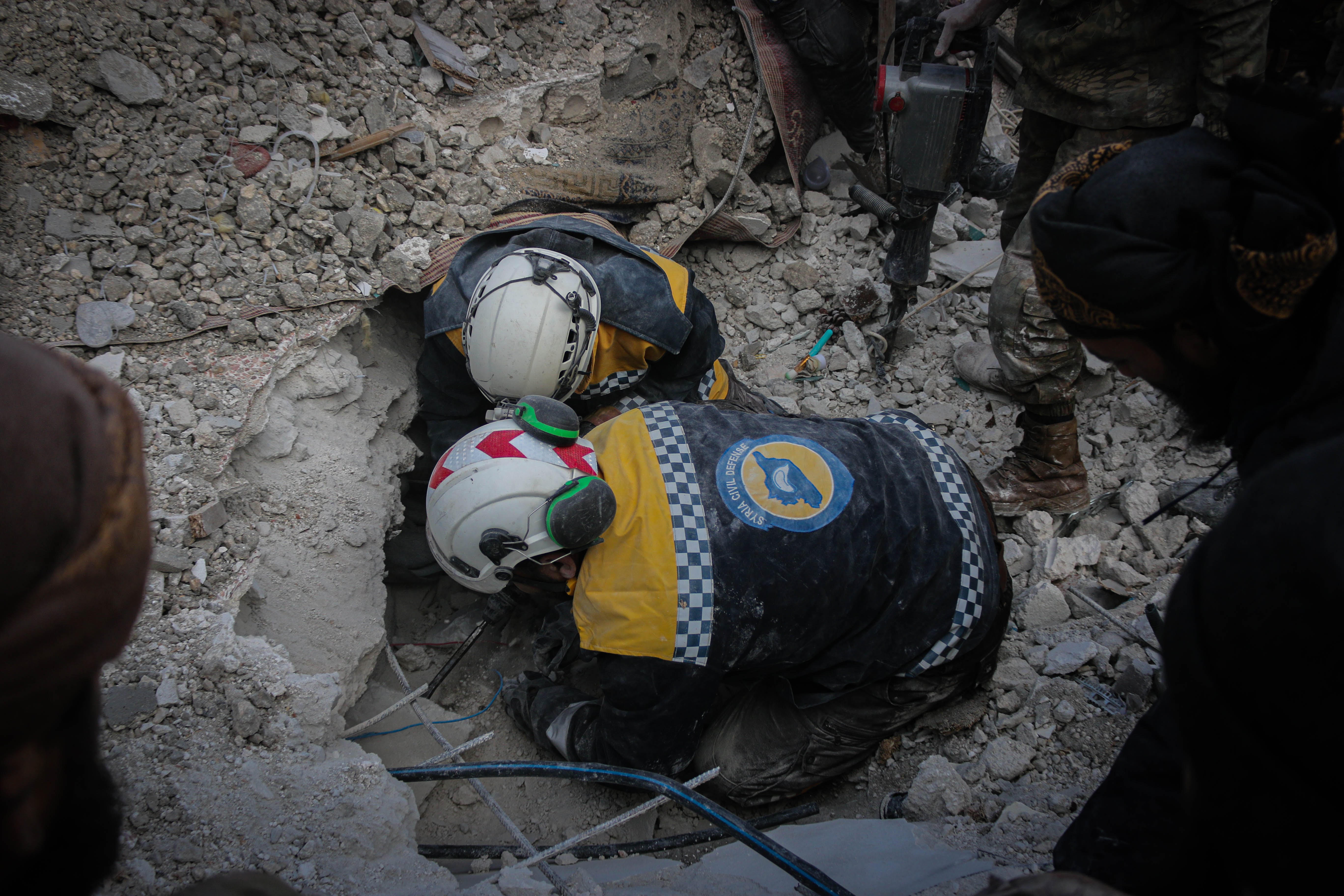At HAG we put a lot of stock in our values.
We push ourselves to be unfailingly curious, questioning why things are the way they are. And we resolve to be brave: following that curiosity where it takes us, even if those conversations are difficult for us or for others. We believe that openness and honesty are key to generating vital change in the humanitarian sector. And we are committed to putting this into practice ourselves.
All this and more is why we are so thrilled to set off on a new stage of the Humanitarian Horizons journey. Humanitarian Horizons is a research program focusing on the Asia-Pacific, carried out with a range of partners such as operational organisations, research groups and consultants, and universities. Our research aims to address challenges facing the sector and help achieve better outcomes for crisis-affected people. With the 2018-2021 program all wrapped up, we’re excited to share what’s coming next.
Chasing new horizons
For 2021-2024 we are continuing to challenge ourselves – building on what has worked in the past, but also stepping out of our comfort zones and sharpening our focus on practical solutions. But how did we decide what to do?
The passion and insight of the HAG team was invaluable when re-envisioning the Humanitarian Horizons program – but we certainly didn’t do it alone. Key research partners and collaborators, humanitarian practitioners and analysts worldwide informed our design process. These consultations helped us identify the research priorities for a humanitarian system facing extraordinary challenges to its practice and confronting fundamental questions about its role and make-up.
Over twelve months, with support from partners, the design process included:
- Key informant interviews – leading thinkers and practitioners in the Asia-Pacific region and beyond shared their views and questions about the state and future of humanitarian action
- Emerging humanitarian issues briefs – prepared by researchers based in the regions, these briefs gave an up-to-date window into operational trends and research needs in South Asia, Southeast Asia, and the Pacific
- A global survey – circulated sector-wide in 8 languages, the survey received 641 responses from 53 countries and showed key priorities for research topics and communication techniques

- Desk review – we looked at existing research, operational needs, and – once we had some emerging themes – the gaps in knowledge that are slowing progress towards a fairer and more responsible humanitarian system
- An independent review – conducted by Co-Lab in late 2020, the mid-term review of Humanitarian Horizons 2018-2021 allowed us to apply external feedback and reflect on lessons
- Feedback – research experts and key partners helped us shape the proposal along the way
Thank you to those who are visible as well as the hundreds (literally!) whose names we don’t know, but who shared their views on what the program should look at and how it should communicate.

The 2021-2024 research streams
The new research program is designed to help shift practices to be more equitable and sustainable. We want to do this in ways that are themselves equitable and sustainable – ensuring holistic partnerships and self-reflexive practices. These ambitions also reflect our values of being ethical, flexible and continuously enabling. We recognise that competing priorities and cognitive biases affect people’s ability to take action, so the program applies insights from behavioural science to increase the effectiveness of our recommendations. Work is already underway on the three research streams, with partnership brokering activities and scoping studies kicking off in 2021.
Real-time analysis and influence
The Real Time Analysis and Influence stream aims to provide timely exploration of emerging issues and thematic areas across the humanitarian sector. Through critical thinking and creating real time evidence, this stream will stimulate discussion and inform practice in the context of humanitarian response, including conflict and disaster response operations and other practices of operational agencies such as fundraising, advocacy, or standards-setting.
Our first paper in this stream will be a study of green practices in the response in Tonga following the eruption of Hunga Tonga–Hunga Ha’apai.
People, Power and Local Leadership
The ‘People, power and local leadership’ research stream recognises that to achieve meaningful change we need to ask fundamental questions about who sets the agenda and benefits from it; how effective humanitarian outcomes are defined and measured; and who produces, owns, and shares knowledge. It will explore inequalities in current practices and opportunities to address them, through the lens of power dynamics and local leadership.
This stream has two tracks. The first examines the relationship between local leadership and humanitarian outcomes. The second explores power dynamics in humanitarian analysis to understand and improve approaches to generating, recognising and using knowledge.
Greening the System
‘Greening the system’ refers to strengthening environmentally friendly approaches to addressing humanitarian needs and measurably reducing the harmful impacts by the humanitarian system on the climate and the environment. This research stream will build on and explore in practice the concept of ‘green response’ developed by the International Federation of Red Cross (IFRC).
To protect and preserve human life we need to see a meaningful reduction in harmful environmental impacts by the humanitarian sector. Responding to this imperative, this stream aims to measurably reduce the negative impacts of humanitarian action on the climate and environment.
Beneficence and benefit
In the Humanitarian Horizons research program and throughout our work, we adhere to ACFID’s Principles and Guidelines for Ethical Research and Evaluation in Development. Respect for and commitment to these principles is reflected in the work that we do and the way that our organisation is structured. In Humanitarian Horizons they are assured by a fourth stream, which upholds governance, accountability, and monitoring, evaluation and learning (MEL) processes.
For the 2021-2024 program we have:
- Revitalised the governance structures, retaining the role of our Research Advisory Committee (RAC) which enabled such valuable guidance in the previous program, and updating our MEL approaches
- Strengthened our approaches to partnership, building our joint work in Humanitarian Horizons into a larger, long-term framework for collaboration
- Developed a new communications strategy, pushing ourselves to be inventive and ensuring we stay attuned to the diverse needs of our audiences. We plan to bring you a new podcast series, deepen connections with governments and media in the region and we want to hear from you and to engage on the humanitarian issues that matter.

We hope you’re as excited as we are about the discoveries and future pathways that these horizons will bring. And we’d love to hear from you! Is your organisation interested in being part of greening the system, or looking to reflect on its own ways of working? Do you have ideas about what steps are needed to help achieve change? Is there an important topic that the sector hasn’t taken on yet? Find us on:
Photo by Tanya Guillory on Unsplash






